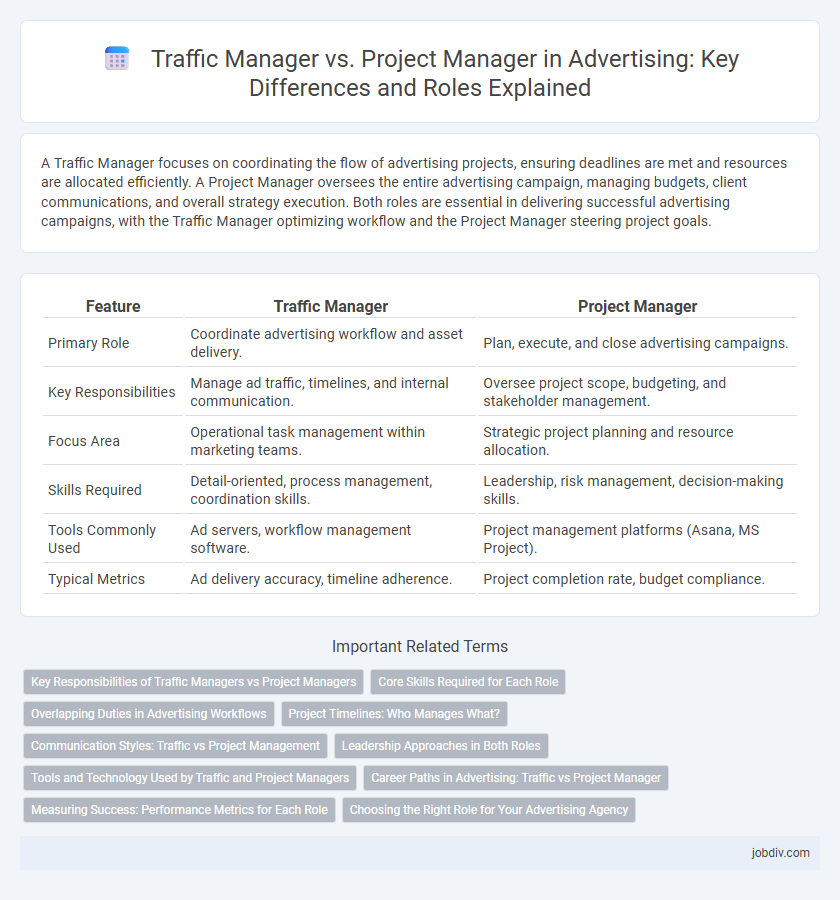A Traffic Manager focuses on coordinating the flow of advertising projects, ensuring deadlines are met and resources are allocated efficiently. A Project Manager oversees the entire advertising campaign, managing budgets, client communications, and overall strategy execution. Both roles are essential in delivering successful advertising campaigns, with the Traffic Manager optimizing workflow and the Project Manager steering project goals.
Table of Comparison
| Feature | Traffic Manager | Project Manager |
|---|---|---|
| Primary Role | Coordinate advertising workflow and asset delivery. | Plan, execute, and close advertising campaigns. |
| Key Responsibilities | Manage ad traffic, timelines, and internal communication. | Oversee project scope, budgeting, and stakeholder management. |
| Focus Area | Operational task management within marketing teams. | Strategic project planning and resource allocation. |
| Skills Required | Detail-oriented, process management, coordination skills. | Leadership, risk management, decision-making skills. |
| Tools Commonly Used | Ad servers, workflow management software. | Project management platforms (Asana, MS Project). |
| Typical Metrics | Ad delivery accuracy, timeline adherence. | Project completion rate, budget compliance. |
Key Responsibilities of Traffic Managers vs Project Managers
Traffic Managers in advertising are responsible for coordinating workflows, managing schedules, and ensuring timely delivery of creative assets across departments to maintain efficient campaign execution. Project Managers oversee the entire lifecycle of advertising projects, from planning and budgeting to stakeholder communication and quality control, ensuring objectives align with client goals. Traffic Managers focus on operational logistics, while Project Managers handle strategic oversight and resource allocation.
Core Skills Required for Each Role
Traffic Managers excel in workflow coordination, deadline management, and resource allocation to ensure timely campaign delivery, leveraging strong organizational skills and communication with cross-functional teams. Project Managers require proficiency in strategic planning, risk assessment, budget control, and stakeholder management to drive advertising projects from initiation to completion. Both roles demand expertise in project timelines and team collaboration, but Traffic Managers prioritize operational efficiency while Project Managers focus on overarching project goals and client satisfaction.
Overlapping Duties in Advertising Workflows
Traffic Managers coordinate the scheduling and flow of advertising projects to ensure deadlines are met, managing resource allocation and internal communications. Project Managers oversee the broader scope of advertising campaigns, including budget management, client liaison, and overall project execution, while also ensuring timelines align with strategic goals. Their overlapping duties include tracking project progress, facilitating team collaboration, and resolving workflow bottlenecks to optimize advertising production efficiency.
Project Timelines: Who Manages What?
Traffic Managers oversee the scheduling and prioritization of advertising tasks to ensure deadlines are met efficiently, focusing on coordinating workflow between creative teams and clients. Project Managers handle the broader scope of project timelines, including budgeting, resource allocation, and milestone tracking to guarantee the overall campaign delivery aligns with strategic goals. Clear delineation between these roles enhances productivity and minimizes delays in advertising project execution.
Communication Styles: Traffic vs Project Management
Traffic Managers prioritize clear, concise communication to streamline workflow and ensure deadlines are met across advertising campaigns. Project Managers adopt a more comprehensive communication style, coordinating cross-functional teams, resolving conflicts, and aligning stakeholders with strategic objectives. Effective advertising campaigns rely on the distinct communication strengths of both roles to optimize project delivery and client satisfaction.
Leadership Approaches in Both Roles
Traffic Managers emphasize workflow coordination and deadline adherence, using a leadership approach centered on operational efficiency and resource allocation to ensure advertising campaigns progress smoothly. Project Managers adopt a strategic leadership style by integrating cross-functional teams, managing scope, and aligning project goals with business objectives to drive successful campaign delivery. Both roles require strong communication skills, but Traffic Managers lead through process optimization while Project Managers focus on guiding teams through the project's lifecycle and strategic milestones.
Tools and Technology Used by Traffic and Project Managers
Traffic Managers utilize digital workflow platforms, such as Asana and Trello, to coordinate advertising schedules and track campaign progress in real-time. Project Managers employ comprehensive project management suites like Microsoft Project and Jira to oversee resource allocation, risk management, and cross-functional team collaboration. Both roles integrate communication tools like Slack and reporting software such as Google Analytics to optimize campaign execution and monitor performance metrics efficiently.
Career Paths in Advertising: Traffic vs Project Manager
Traffic Managers in advertising specialize in coordinating workflow and ensuring timely delivery of campaigns, focusing on optimizing schedules and resource allocation. Project Managers oversee the entire campaign lifecycle, managing budgets, client communication, and cross-functional teams to ensure strategic objectives are met. Career progression for Traffic Managers often leads to operations or production management roles, while Project Managers frequently advance into senior management or account director positions within advertising agencies.
Measuring Success: Performance Metrics for Each Role
Traffic Managers measure success primarily through workflow efficiency, on-time project delivery, and resource allocation accuracy, ensuring smooth advertising campaign execution. Project Managers focus on budget adherence, scope fulfillment, client satisfaction, and overall project ROI, aligning campaign outcomes with strategic business goals. Both roles utilize key performance indicators (KPIs) to optimize processes and drive measurable advertising success.
Choosing the Right Role for Your Advertising Agency
Traffic Managers streamline workflow by coordinating project timelines and resource allocation across creative, production, and media teams, ensuring deadlines are consistently met. Project Managers oversee broader strategic planning, budget management, and client communication, driving campaign execution from initiation to delivery. Selecting the right role depends on your agency's needs for operational efficiency versus strategic oversight in advertising campaign management.
Traffic Manager vs Project Manager Infographic

 jobdiv.com
jobdiv.com